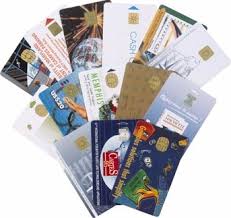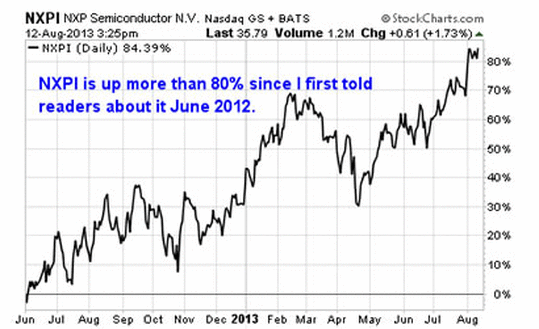| MARKET CONDITIONS I covered the precursor to these technologies as well as some of the players in this market-space in my Special Report entitled the "Death of Cash". You're going to start hearing more and more about the capabilities of these different technologies as well as seeing how all of these things play out and impact the world in which we live. Get on-board this great opportunity...YESTERDAY! |
By Andy Obermueller
The Wall Street crowd is starting to get the picture.
On the cover of a recent issue of Fortune magazine: "The Death of Cash," there was an article examining an impending transition that I've been talking about for some time.
The magazine examined some large companies as the drivers in this new technological push, which hinges largely on the continued adoption of portable devices, like cellphones, that can be used much like a credit or debit card. Its winners are Google (Nasdaq: GOOG) because of its Google Wallet initiative, which I was among the first to cover; eBay's (Nasdaq: EBAY) PayPal; Visa (NYSE: V); MasterCard (NYSE: MA); Apple (Nasdaq: AAPL) and Facebook (Nasdaq: FB).
Those are great companies that will lead the trend. But while everyone else is looking at the obvious "winners," it will take some time for this macro trend to move the needle for companies as big as these.
Instead, I've got my eye on a small company that's at the forefront of this game-changing trend.
I first mentioned this game-changing technology in an article about another stock in this sector I like: payment processing firm Zebra (Nasdaq: ZBRA).
I like this concept for a lot of reasons. For one, I hate it when my credit card is taken out of my view. Two of my cards -- a debit card from my bank in Texas and my Capital One Visa -- were hacked recently, which meant both cards needed to be replaced. I didn't get stuck with any of the fraudulent charges, but replacing a card is still a hassle -- and securing the number on a special microchip would render fraud far more difficult.
It's also going to open up mobile payments to a whole new audience, notably among young people and a portion of the population that doesn't use banks. That's because not only is the credit card in Google Wallet available as a prepaid card -- no credit required -- it is also available on a prepaid smartphone through Virgin Mobile. This will certainly help push this technology into the mainstream.
And while I like Zebra as a way to profit from this technology, my research has led me to a stock I like even more.
As I said, it's not Google. Nor do I think it will be Sprint (NYSE: S), which runs the network, and it's not Citigroup (NYSE: C) or MasterCard, which administer the card Google Wallet uses.
Instead, the likely winner is a company most people have never heard of -- NXP Semiconductors (Nasdaq: NXPI). It makes the special chips that go in the phone that "talk" to cash registers. The technology is known as near-field communications (NFC), and NXP is the leader, with critical existing supplier relationships with all the major phone manufacturers, including Apple.
And mobile wallets are a booming business for NXP: It grew 19% in 2011, 41% in 2012 and is on track to grow 30% this year (to $1.26 billion), according to analysts at Merrill Lynch. These ID chips were just 16% of NXP's $4 billion revenue base in 2011, but should account for 35% of sales by 2015.
The real question for investors: Can NXP make money with its cutting-edge chips? After all, some chip makers offer boring products, and are content with gross profit margins of just 15% or 20%. "We'll make it up on volume," these chip makers say.
NXP doesn't need to offer up such excuses.
Thanks to a combined $5 billion in R&D spending over the past six years, this company's products are so advanced that NXP can charge top dollar for them. That strong pricing power fuels gross margins in excess of 45% and EBITDA margins of 30%.
And that's led to market-beating returns for investors so far.
The Wall Street crowd is starting to get the picture.
On the cover of a recent issue of Fortune magazine: "The Death of Cash," there was an article examining an impending transition that I've been talking about for some time.
The magazine examined some large companies as the drivers in this new technological push, which hinges largely on the continued adoption of portable devices, like cellphones, that can be used much like a credit or debit card. Its winners are Google (Nasdaq: GOOG) because of its Google Wallet initiative, which I was among the first to cover; eBay's (Nasdaq: EBAY) PayPal; Visa (NYSE: V); MasterCard (NYSE: MA); Apple (Nasdaq: AAPL) and Facebook (Nasdaq: FB).
Those are great companies that will lead the trend. But while everyone else is looking at the obvious "winners," it will take some time for this macro trend to move the needle for companies as big as these.
Instead, I've got my eye on a small company that's at the forefront of this game-changing trend.
I first mentioned this game-changing technology in an article about another stock in this sector I like: payment processing firm Zebra (Nasdaq: ZBRA).
I like this concept for a lot of reasons. For one, I hate it when my credit card is taken out of my view. Two of my cards -- a debit card from my bank in Texas and my Capital One Visa -- were hacked recently, which meant both cards needed to be replaced. I didn't get stuck with any of the fraudulent charges, but replacing a card is still a hassle -- and securing the number on a special microchip would render fraud far more difficult.
It's also going to open up mobile payments to a whole new audience, notably among young people and a portion of the population that doesn't use banks. That's because not only is the credit card in Google Wallet available as a prepaid card -- no credit required -- it is also available on a prepaid smartphone through Virgin Mobile. This will certainly help push this technology into the mainstream.
And while I like Zebra as a way to profit from this technology, my research has led me to a stock I like even more.
As I said, it's not Google. Nor do I think it will be Sprint (NYSE: S), which runs the network, and it's not Citigroup (NYSE: C) or MasterCard, which administer the card Google Wallet uses.
Instead, the likely winner is a company most people have never heard of -- NXP Semiconductors (Nasdaq: NXPI). It makes the special chips that go in the phone that "talk" to cash registers. The technology is known as near-field communications (NFC), and NXP is the leader, with critical existing supplier relationships with all the major phone manufacturers, including Apple.
And mobile wallets are a booming business for NXP: It grew 19% in 2011, 41% in 2012 and is on track to grow 30% this year (to $1.26 billion), according to analysts at Merrill Lynch. These ID chips were just 16% of NXP's $4 billion revenue base in 2011, but should account for 35% of sales by 2015.
The real question for investors: Can NXP make money with its cutting-edge chips? After all, some chip makers offer boring products, and are content with gross profit margins of just 15% or 20%. "We'll make it up on volume," these chip makers say.
NXP doesn't need to offer up such excuses.
Thanks to a combined $5 billion in R&D spending over the past six years, this company's products are so advanced that NXP can charge top dollar for them. That strong pricing power fuels gross margins in excess of 45% and EBITDA margins of 30%.
And that's led to market-beating returns for investors so far.
I expect results like this to continue as NXP grows revenue from the mobile wallet market -- especially with Google behind it. I think that alternative payment technologies are one of the hottest opportunities for aggressive growth investors right now. This is a rocket ship you need to book a ticket on.


 RSS Feed
RSS Feed
